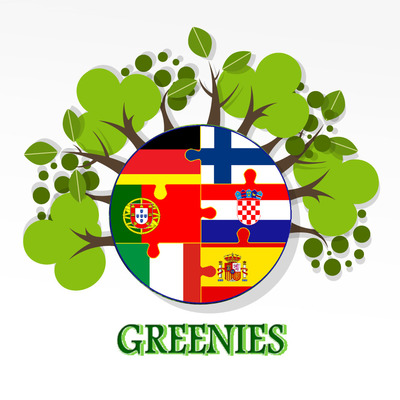
Green Economy Exploration by a Network of Interconnected European Students
All European countries are facing changing conditions due to climate change. We will have to cope with these changes and will have to stop the increasing global warming as soon as possible. We must think of a life thought more of being than having, seeking the satisfaction of our quality of life without compromising the future of future generations. With our project we want to foster an equitable shift to greener economies and more sustainable societies. After working on the consequences of climate change in the partner countries, students will learn about the concept of a Green Economy as a possibility to cope with the impacts of climate change. They will be more aware of the necessity to change their private life and also the social and economic ones. The experience of examples of good practice for a Green Economy will motivate and spur them to take an active part in the transition. They will expand their knowledge by creating a website with information about aspects of a Green Economy like ecological constructions, energy production, sustainable city life,
ecological production, sustainable food (slow food), sustainable tourism, recycling or sustainable economic models. The website will deliver digital learning materials and links created by our students, so other students and schools can use the
materials and profit from our project.
The six schools participating in the project represent different climate zones. They are secondary schools with the main focus on vocational, language or ICT skills: IES Arcucas Domingo Rivero (Spain), Agruppamento de Escolas R.Jorge
Augusto Correia (Portugal), XVI. Gimnazija Zagreb (Croatia), Liceo Scientifico Statale “Marie Curie” (Italy), Hankoniemen lukio (Finland) and Berufskolleg Viersen des Kreises Viersen (Germany). The students are between 15 and 19 years old.
Nearly 150 full time students and about 18 teachers will be directly involved in the project activities taking place at the six partner schools.
During the 24 months of the project, the work is organised in special courses and afternoon meetings between the LTTs and by working together in multinational groups during the LTTs. An eTwinning group will give them the opportunity to link and work together not only at the meetings but also in the time between. There will be six meetings, one organised by each partner school. During their stay, the students will be host in families.
Our students will raise their environmental awareness by anticipating their life in 2060 with the help of scenerios, checking their carbon footprint, reflecting their consumption behaviour and examining their schools' ecological friendliness. Our students will learn about the concept of Green Economy by participating in a learning café and workshops and visiting examples of best practice during the LTTs. Moreover, we will integrate reflecting activities which will allow students to think about and discuss the development of climate change.
The students will expand and improve their digital competences by trying and using different tools for surveys, learning videos, for comics, quizzes or ebooks and by deciding on the best tools for their work on the materials. They will establish
their own website, where they will publish their results. Communicating via chats, video conferences or blog entries on the eTwinning platform will deepen not only their ICT skills but also their English language skills. They will also use their language skills in presentations, discussions, work in multinational groups or private situations during the exchanges.
Our students will learn about the influence of cultural, geographical and historical aspects of each participating country facing the Green Economy challenge by exchanging the characteristics of their regions at the beginning of each meeting.
They will study the historical and cultural aspects of cities like Helsinki and Aachen and analyse the eco-friendliness of these cities. They will make excursions to nature reserves to get an impression of the landscape and problems due to climate change like desertification. They will learn about consumption habits in the partner countries by participating in the daily life of their host families.
Our outcomes of the activities will be published on a website and with the help of the eTwinning project “Global Warming and Sustainability”. Moreover, we will spread our experiences by creating an Erasmus+ Information Corner in every partner school, presenting the results to the school communities in our regions and implementing ecological measures in our schools.
Our project contributes to a sustainable Europe because it will show our students many options for action and motivate them to take an active part in the transition to a Green Economy. In addition, it will ensure the dissemination of the experience and results to other schools and students in Europe who can use our results.